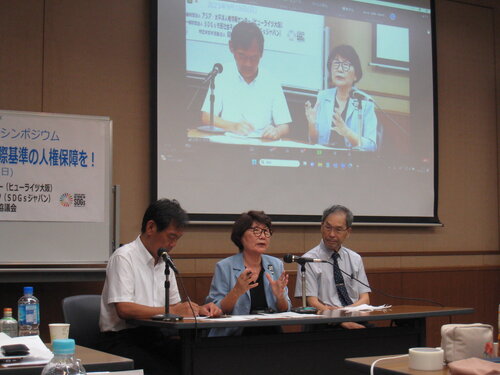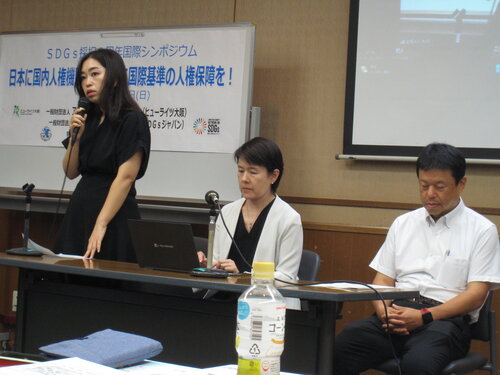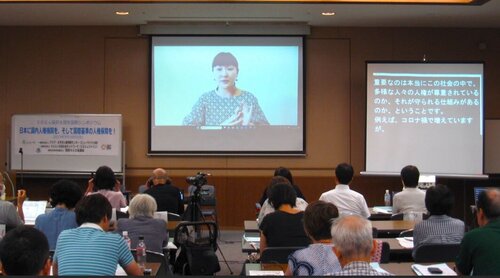- TOP
- 資料館
- FOCUS
- December 2023 - Volume 114
- Call to Establish an NHRI and to Implement International Human Rights Standards in Japan
FOCUS December 2023 Volume 114
Call to Establish an NHRI and to Implement International Human Rights Standards in Japan
On 10 September 2023, HURIGHTS OSAKA together with SDGs Japan and the Kansai NGO Council co-hosted in Osaka city an International Symposium Commemorating the 8th Anniversary of Adoption of SDGs. It had the theme: "Establish National Human Rights Institution in Japan and Implement International Human Rights Standards!" The International Symposium was attended by approximately one hundred seventy participants including those who joined online.
Keynote Speeches
The symposium started with two keynote speeches by Seigo Fujiwara, a lawyer and vice-chairperson of the Japan Federation of Bar Associations' Committee for the Realization of a National Human Rights Institution, and Shin Heisoo, a former Commissioner of the National Human Rights Commission of the Republic of Korea (NHRCK) and the current Chairperson of the Board of Directors of the Korean Center for United Nations Human Rights Policy.
 Heisoo Shin (middle) and Seigo Fujiwara (right) giving keynote speeches
Heisoo Shin (middle) and Seigo Fujiwara (right) giving keynote speeches
Citing the End of Mission Statement issued on 4 August 2023 by the United Nations Working Group on Business and Human Rights, Mr. Fujiwara stated that an independent National Human Rights Institution (NHRI) that would provide human rights remedies, policy recommendations, and human right education is needed in order to protect the human rights of those vulnerable to human rights violations. He said that although judicial remedies were available, Japanese courts were reluctant to apply international human rights law and relied only on domestic laws (hate speech acts, for example, have no appropriate penalty under the law). Also, he cited the difficulty of detainees in an immigration detention facility to seek remedy for human rights violations (such as medical neglect) because of financial costs and complicated procedures (such as preparing complaints). He said an NHRI would play a pivotal role in obtaining remedies for human rights violations through prompt investigation and issuance of recommendations in accordance with the international human rights standards as well as provide guidance and education to prevent recurrence of such human rights violations.
Mr. Fujiwara also noted the repeated recommendation to Japan on the establishment of an NHRI by human rights treaty bodies (such as those of the International Convention on the Elimination of All Forms of Racial Discrimination, the Convention against Torture, and the Convention on the Elimination of All Forms of Discrimination Against Women) as well as the Universal Periodic Review of the United Nations Human Rights Council. Concluding his speech, Mr. Fujiwara exhorted the members of civil society, NGOs and others working on human rights issues in different fields to unite and expand the movement in order to change the government's reluctant attitude and realize the establishment of an NHRI in Japan.
In her speech, Ms Shin talked about the process of establishing the NHRCK in 2001, the struggles in securing its independence, and its value and advantage. She discussed the efforts of the Korean civil society in pressuring the Korean government to support the establishment of an independent and effective NHRI. The campaign eventually succeeded with the enactment of the National Human Rights Commission Act in 2001. But the NHRCK suffered from several crises affecting its independence, reducing financial and human resources and having a Chairperson who did not have any expertise on human rights. Nevertheless, Ms Shin credited the NHRCK for having easy accessibility for the public, dedicated staff members and efficient service.
Session on Issues
A session on several issues followed the two keynote speeches with four speakers from civil society organizations working on human rights.
 Speakers: Sadamu Takahashi, Yumiko Horie, Tomoko Morimoto
Speakers: Sadamu Takahashi, Yumiko Horie, Tomoko Morimoto
On human rights of sexual minorities, Tomoko Morimoto (a lawyer-member of the Kansai legal team for "Marriage for All Japan" Lawsuit) reported on five court petitions on same-sex marriage filed in different parts of Japan.[1] She said that four courts ruled that refusing to recognize same-sex marriage was unconstitutional (and only the Osaka District Court ruled otherwise). The decisions of the five courts had been appealed to the High Court. She mentioned the long delay in getting court decisions, with one petitioner dying of illness while waiting for a court decision on a petition filed in 2019. She said that an NHRI would be able to investigate and take immediate action on human rights issues and give hope to the parties involved. She also expressed her hope that with an NHRI, the society's perception of sexual minorities would improve for the better by educating and enlightening the people.
On the rights of the child, Yumiko Horie (Director of Advocacy Department, Save the Children Japan) acknowledged that the enforcement of the Basic Act on the Child and the Act for the Establishment of the Children and Families Agency starting on 1 April 2023 was a welcomed first step toward protecting child rights. That being said, she pointed out the challenge of having an independent Commissioner for Children with mandates to monitor, investigate and provide recommendations on the status of child rights. She also said that the establishment of an independent child rights protection body and/or an NHRI had been repeatedly recommended by the United Nations Committee on the Rights of the Child.
Ms. Horie noted the inclusion in the report of the external investigation panel of Johnny and Associates on the need to prevent the recurrence of sexual abuse in the Johnny and Associates case. The report mentions the UN Guiding Principles on Business and Human Rights.[2] She stressed the necessity of promoting the need for an NHRI that would protect the rights of vulnerable people and for them to obtain remedies and corrective measures quickly and without financial cost.
On Buraku discrimination, Sadamu Takahashi (General Secretary, Osaka Federation of Buraku Liberation League) mentioned the Act on the Promotion of the Elimination of Buraku Discrimination enacted in 2016. Though he acknowledged the practical significance of the phrase "elimination of Buraku discrimination," Mr. Takahashi stressed the need for a comprehensive human rights system beyond a law that could not provide specific regulations or penalties, and to criticize the Japanese government's consistently passive attitude towards legal restrictions and appropriate remedies against discrimination. In 2016, the Tokyo High Court ruled in favor of a petition to stop a publisher called "Jigensha/Tottori Loop" from republishing the National Buraku Survey, a compilation of information on the location of places where Buraku people lived, their names, the number of households, their population, occupations and living conditions, as a violation of the "right not to be discriminated against." Making the best use of the Tokyo High Court decision, Mr. Takahashi expressed his determination to fight for the enactment of a comprehensive human rights relief system including establishment of an NHRI and an anti-discrimination law through activities in solidarity with other marginalized groups.
 Natsuki Yasuda (a photojournalist and Vice President of "Dialogue for People"), in a video message, raised a question on whether or not the human rights of diverse people were truly protected in Japanese society, even though the word "diversity" had been commonly heard in Japan. Ms. Yasuda pointed out the problem of the system that allowed the detention of non-Japanese in immigration detention facilities without judicial intervention and the power of immigration authorities to make arbitrary decisions without any limitation on time, despite the fact that such detention deprived people of their physical freedom. She recalled her own experience of being the target of hate speech and seeking redress in court, which was costly in terms of money, time, and effort. Since many people were unable to seek judicial relief for human rights violations, she saw an urgent need to establish an NHRI that could respond and address such human rights violations quickly.
Natsuki Yasuda (a photojournalist and Vice President of "Dialogue for People"), in a video message, raised a question on whether or not the human rights of diverse people were truly protected in Japanese society, even though the word "diversity" had been commonly heard in Japan. Ms. Yasuda pointed out the problem of the system that allowed the detention of non-Japanese in immigration detention facilities without judicial intervention and the power of immigration authorities to make arbitrary decisions without any limitation on time, despite the fact that such detention deprived people of their physical freedom. She recalled her own experience of being the target of hate speech and seeking redress in court, which was costly in terms of money, time, and effort. Since many people were unable to seek judicial relief for human rights violations, she saw an urgent need to establish an NHRI that could respond and address such human rights violations quickly.
Rimyong Park is a program staff of HURIGHTS OSAKA
For further information, please contact HURIGHTS OSAKA.
[1] Currently, the court decisions in the five lawsuits are pending appeal in Tokyo High Court, Sapporo High Court, Nagoya High Court, Osaka High Court and Fukuoka High Court respectively.
[2] Guiding Principles on Business and Human Rights:Implementing the United Nations ''Protect, Respect and Remedy' Framework, https://www.ohchr.org/sites/default/files/documents/publications/guidingprinciplesbusinesshr_en.pdf.
